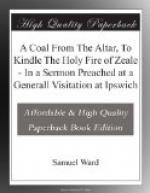3. Zeale is every where spoken against it hath many enemies and few friends: the world can no more abide it, then beasts can the elementary fire, the rebukes of many have falne upon it, the Divell weaves cunning lies to bring downe the honour of it. Oh that wee could raise and maintaine it, by setting forth the deserved praise of it; and challenge it from the false imputations of such as hate it without a cause.
4. Zeale hath in this our earthly molde, little fuell, much quench-coale, is hardly fired, soone cooled. A good Christian therefore would bee glad to know the Incentives and preservatives of it, which might enkindle it, enflame it, feed it, and revive it when it is going out.
5. Zeale in the worlds opinion, is as common as fire on every mans hearth, no mans heart without zeale, if every man might be his owne judge; If most might be heard there is too much of it; but the contrary will appear if the right markes bee taken, and the true rules of triall and conviction bee observed, and the heart thereby examined.
6. Zeale generally handled will break as lightning in the aire, and seize upon no subject: Application must set it on mens harts, and exhortation warme this old and colde age of the world, chiefly this temperate climate of our nation.
First Part.
It was sayd of olde, that zeale was an Intension of love: of late, that it is a compound of love and anger, or indignation.
The Ancients aimed right, and shot neere, if not somwhat with the shortest. The moderne well discovered the use and exercise of more affections, then love, within the fathome and compasse of zeale; but in helping that default, went themselves somewhat wide, and came not close to the marke: which I ascribe not to any defect of eye-sight in those sharpe sighted Eagles; but onely to the want of fixed contemplation. And to speake truth, I have oft wondered why poore Zeale, a vertue so high in Gods books, could never be so much beholding to mens writings as to obtain a just treatise, which hath beene the lot of many particular vertues of inferiour worth; a plaine signe of too much under-value and neglect.
Hee that shall stedfastly view it, shall finde it not to bee a degree or intension of love, or any single affection (as the Schooles rather confined then defined zeale) neither yet any mixt affection (as the later, rather compounded then comprehended the nature of it) but an hot temper, higher degree or intension of them all. As varnish is no one color, but that which gives glosse & lustre to all; So the opposites of zeale, key-coldnes and lukewarmnesse, which by the Law of contraries must bee of the same nature, are no affections, but severall tempers of them all.
[Sidenote: Acts 26. 7.]
Paul warrants this description where hee speakes of the twelve Tribes. They served God with intension or vehemency.




